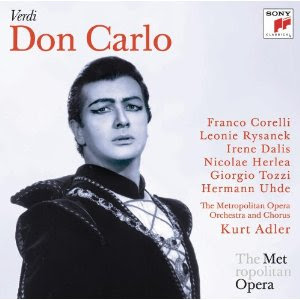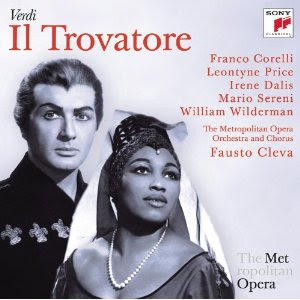
Ópera, ópera, ópera, ópera, cinema, música, delírios psicanalíticos, crítica, literatura, revistas de imprensa, Paris, New-York, Florença, sapatos, GIORGIO ARMANI, possidonices...
quarta-feira, 31 de agosto de 2011
segunda-feira, 29 de agosto de 2011
domingo, 28 de agosto de 2011
Bayreuth - III - Tannhäuser (as fotos)


Bayreuth - II - Tannhäuser


Absolutamente pervertido, o Tannhäuser de Sebastian Baumgarten foi apupado do princípio ao fim! Segundo consta, a liberdade da encenação confundiu-se com uma obra grotesca, nos antípodas da concepção de Wagner.
Perversão metafórica em Bayreuth, evidentemente, mas não só... Para detalhes mais sórdidos, sugiro uma leitura atenta da critica de Mark Ronan, como segue.
sábado, 27 de agosto de 2011
Destinos Dissolutos


Por motivos de agenda, as deslocações da família Dissoluta à Casa Mãe encontram-se suspensas. Para mais, odiamos furacões, que são uma grande maçada!
Desta feita, dada a excelsa qualidade da nova produção de Don Giovanni (encenação de Carsen), no alla Scala, aí vamos nós, para uma récita de sonho, a 16 de Dezembro de 2011.
Aos que desejarem, endereço convite para partilharem o nosso camarote!
Afinal de contas, juntar, numa produção, Terfel, D’Arcangelo, Netrebko, Filianoti, Frittoli e a direcção de Barenboim...
Vão-se as pratas, fiquem os lingotes de ouro!
quinta-feira, 25 de agosto de 2011
Narciso Ceausescu

(Nicolae Ceausescu)
A Autobiografia de Nicolae Ceausescu é um notável documentário de Andrei Ujica, integralmente concebido com imagens da propaganda romena.
O filme retrata a ascensão e queda do regime liderado por Nicolae Ceauscescu (1918-1989). Tendo início com a morte de Gheorghiu-Dij e transmissão do poder ao seu sucessor “dinástico”, culmina com o julgamento sumário de Nicolae e sua mulher, Elena.
Recordo a morte do deplorável ditador e respectiva concubina, numa manhã de final de Dezembro de 1989, era eu um jovem adulto. Por ocasião do filme, temi que as impressionantes imagens do fuzilamento do casal fossem exibidas. Na época, correram mundo e chocaram-me profundamente.
Percebi que o gesto grotesco – a exibição dos troféus de caça – correspondia a uma prova fálica do triunfo, porventura reclamada por um povo oprimido e desejoso de vingança.
Inteligentemente, Ujica não embarca neste dificilmente resistível cliché!
Sempre nutri interesse pela personalidade de Nicolae Ceausescu. O seu despostismo (quase) ilimitado intrigava-me sobremaneira. Por esta razão, num movimento impulsivo, acorri à sala do Monumental, assim que soube da estreia do filme, hoje mesmo.
Evidentemente, a figura do ditator é omnipresente. O retrato que se observa é de um homem absolutamente fundido com o poder, reclamando em permanência gratificações narcísicas – a aclamação por parte do objecto (povo, colegas de ofício, nomenclatura, etc.), diante da sua suprema glória edificante (assaz megalómana), é transversal a toda a obra.
A personagem que as imagens reais revelam enferma de um narcisismo patético e caricatural, que a todo o instante exige do outro um reconhecimento das suas excelsas capacidades.
De permeio, deparamos com uma criatura profundamente desinteressante, roçando a rudeza. Embora frugal em público, no racato, a película revela um sábio culto aburguesado do ócio e demais prazeres capitalistas, sempre na companhia de Elena e restante séquito.
Imperdível!
A Autobiografia de Nicolae Ceausescu

Bayreuth - I



À semelhança dos demais festivais líricos – quiçá por força da crise – os ecos de Bayreuth escasseiam!
Contudo, a abc faz uma síntese do desastroso Tannhäeuser (nova produção), cuja encenação bordeja o lixo. Já no tocante a Lohengrin, outro galo canta, apesar da rataria…
Disse-me um passarinho...
terça-feira, 23 de agosto de 2011
segunda-feira, 22 de agosto de 2011
Os Monstros
Em nome do Pai

Memorável – também – é a transição subtil que se opera entre o universo da idealização – infância pueril e imaculada – e a realidade, mais brutal e profundamente marcada pelo conflito identificatório, perda e ruptura.
Salzburgo - II


domingo, 21 de agosto de 2011
Salzburgo - I


(Anne Schwanewilms, em A Mulher sem Sombra - Salzburgo, Agosto de 2011)
Terá sido da minha vista, porventura menos fina e atenta, mas a crise mundial parece ter afastado a imprensa dos festivais de Salzburgo e Bayreuth!
Até à data, apenas encontrei duas notícias consagradas ao festival austríaco! Quanto a Bayreuth, NADA! Dado que não domino o idioma alemão... Mesmo assim, mantenho a tese da crise famigerada, bode expiatório de todos os dissabores do mundo actual.
Posto isto, dado que me habituei a seguir os ditos festivais, aqui vão as novas. Desta feita, não recorro a critério algum, no tocante à divulgação dos eventos. Com tamanha escassez de divulgação...
Eis, assim, a crítica de A Mulher sem Sombra (Strauss, R.).
quinta-feira, 18 de agosto de 2011
terça-feira, 9 de agosto de 2011
Guillaume Tell
segunda-feira, 8 de agosto de 2011
Orange Verdiana :)

(cena de Aïda)

(Grigollo e Ciofi, como Duque e Gilda - Rigoletto, Orange'11)
Orange está para França, como a Arena di Verona está para Itália: ambos os espaços apresentam récitas de óperas populares, evidentemente dirigidas às massas. Mas, em ambos os locais, as massas comportam-se à altura dos acontecimentos. Tomara a burguesia mais adiposa e lustrosa que frequenta o São Carlos ter a disciplina que impera nos citados espaços!
Acontece que, desde a direcção de Raymond Duffaut - iniciada em 1982 -, as Chorégies d'Orange passaram a dirigir-se a um público mais alargado. O certo é que as receitas de bilheteira de Orange cobrem 85% dos custos, facto único no mundo lírico!
Bref, este ano, contámos com uma reprise de Aïda e um notável Rigoletto!
«(...) une reprise de la production d'Aïda mise en scène en 2006 par Charles Roubaud. A l'époque, Michel Plasson était dans la fosse. On se réjouit qu'en 2011 ce soit le jeune et talentueux chef ossète, Tugan Sokhiev, lequel faisait pour l'occasion ses débuts de chef lyrique à Orange à la tête de son excellent Orchestre du Capitole de Toulouse. Une direction soignée, lyrique, précise et inspirée, aussi prompte à la pompe guerrière qu'aux tourments intimes : l'amour interdit du jeune capitaine égyptien Radamès et de l'esclave éthiopienne Aïda, la jalousie de sa maîtresse et rivale, Amnéris, fille du roi d'Egypte.
Ceux qui déploraient l'absence du Radamès de 2006, Roberto Alagna, la regrettent encore. Ils durent se contenter du ténor uruguayen, Carlo Ventre, bien piètre candidat tant à la gloire militaire qu'à l'effusion sentimentale, dont les aigus poussés et vibrionnants, la ligne de chant pâteuse, n'ont pas donné au personnage le moindre relief.
On n'en dira pas autant de l'Américaine Indra Thomas (déjà tenante du rôle en 2006) dont la présence scénique rappelle celle de sa compatriote, Jessye Norman. Las, la voix non. Dotée d'un timbre agréable et d'une belle musicalité, la soprano a eu tendance à couiner ses grands aigus, peinant à soutenir le haut médium (intonation hasardeuse et vibrato d'instable). La Russe Ekaterina Gubanova, en revanche, n'a pas déçu, Amnéris d'une grande sûreté vocale confortable pour l'ouïe. Quant aux (très) nombreux choeurs, ils auront fait face à une partition foisonnante, ne concédant que quelques (et inévitables) décalages à la spatialisation.
Pour être du genre péplum hollywoodien - mais que faire d'autre dans un tel espace ? -, la mise en scène de Charles Roubaud conduit sans vulgarité ni complaisance excessive (hormis la représentation du harem dans le genre loukoum ou le ballet des esclaves éthiopiens du style Saga Africa) les conflits entre l'Egypte et l'Ethiopie, tels que le librettiste français de Verdi, Camille du Locle, les anticipa en 1871 puisque, nous dit Roubaud, "l'Ethiopie au temps des pharaons n'existait pas et que l'unique guerre égypto-éthiopienne qui ait jamais existé eut lieu en 1975, (...) quatre ans après la première représentation d'Aïda à l'Opéra du Caire". Une mise en scène sans surprise pour un opéra prémonitoire ? C'est cela aussi la magie des Chorégies d'Orange.»
De Rigoletto, le grand public connaît surtout deux airs, reconnaissables entre mille mais d'une jovialité trompeuse: La Donna e mobile et le chœur Duca, duca… Mais l'œuvre, de filiation hugolienne et cruelle de cynisme, n'en a pas moins une puissante portée dramatique. Le metteur en scène, Paul-Émile Fourny l'a bien compris. Pour son second Rigoletto à Orange , il a conservé la même idée directrice que lorsqu'il avait monté l'ouvrage en 2001. Un parti pris plein de bon sens: faire de Gilda, fille sacrifiée de Rigoletto, le cœur de l'ouvrage, loin de l'ingénue tête de linotte qu'on dépeint souvent. Et bien que la scénographie ne convainque pas franchement (le décor, un monumental carrosse renversé surgissant de terre tel un drakkar, prête plus à sourire qu'il n'inquiète) et que certaines chorégraphies semblent parfaitement inutiles (notamment la danse détournée des parapluies, plus proche des Parapluies de Cherbourg que des ombrelles chinoises), les chanteurs, eux, lui rendent pleinement justice.
Ainsi, à 69 ans, le vétéran Leo Nucci, 450 fois Rigoletto, n'a pas toujours la projection suffisante pour fustiger le vent jusqu'aux plus hauts gradins. Mais quel acteur, réellement émouvant lorsqu'il erre tel une âme en peine dans son premier air de l'acte II ! Le public lui rendra un vibrant hommage à la fin de son duo Tutte le feste al tiempo, qu'il bissera sur-le-champ avec une visible exaltation.
Le jeune Vittorio Grigolo confirme quant à lui qu'il est l'un des grands ténors italiens en devenir. Il est un Duc de Mantoue décidément bravache et jouissivement frivole, même s'il manque de gravité pour camper un personnage bien inquiétant. Mais la grande héroïne de la soirée, ce sera sans nul doute Patrizia Ciofi. Sa Gilda, toute de retenue, offre dans l'aigu une palette de nuances qui captive, dès son grand air du premier acte et jusqu'à son abandon final, où elle apparaît comme transfigurée. Elle qui confiait à propos du Théâtre antique avoir la sensation de ne pas pouvoir s'y faire entendre ! Elle y aura réussi… et de la plus belle des manières.»






























